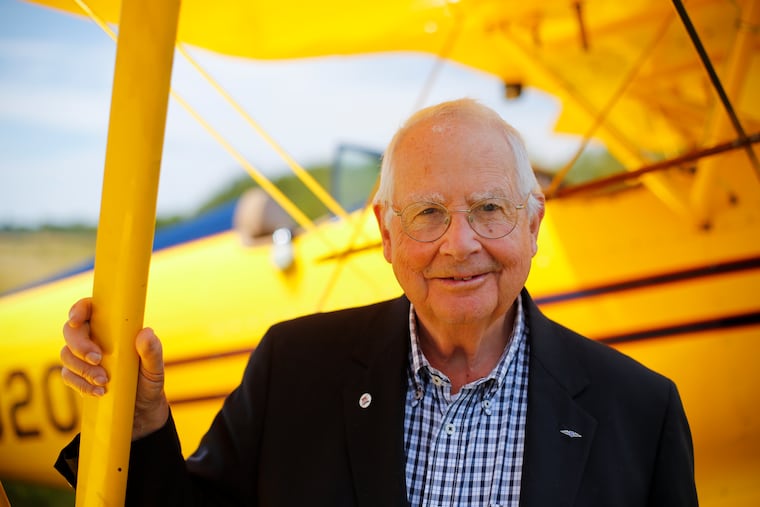R. Anderson ‘Andy’ Pew, former chairman of Pew Charitable Trusts, director at Glenmede Trust Co., and philanthropist, has died at 85
The great-grandson of the founder of Sun Oil Co., he valued philanthropy and community service, and worked hard to be a responsible steward of his family's wealth and influence.

R. Anderson “Andy” Pew, 85, of Philadelphia, former chairman of the Pew Charitable Trusts, director at the Glenmede Trust Co., executive at Sun Oil Co., and celebrated philanthropist, died Saturday, June 25, of complications of prostate cancer at Bryn Mawr Hospital.
The great-grandson of Joseph Newton Pew, the founder of Sun Oil, Mr. Pew was, among other things, longtime chairman of the grants committee and board member at the Pew Charitable Trusts, a Philadelphia-based global organization that “seeks to improve public policy, inform the public, and invigorate civic life.”
He was a director and trustee at Glenmede, an investment and wealth management firm, and earlier worked in Sun Oil’s auditing and treasury departments, the products group, as corporate secretary, and served on its board of directors. He also formed and was president of Helios Capital Corp., a leveraged leasing subsidiary.
As successful as he was in business, Mr. Pew was equally accomplished as a philanthropist, volunteer, and community activist. He worked with House of Umoja in counseling young Philadelphia gang members in the 1970s and quietly contributed to countless civic, social, artistic, scientific, educational, and health-care organizations for decades.
”One should strive for wealth or power only for what could be constructively done with it,” he told the New York Times in 1981. “It is a vehicle, not an end.”’
Mr. Pew served on the boards at Children’s Hospital of Philadelphia, the Jackson Laboratory biomedical research institute in Bar Harbor, Maine, and other groups. He was a trustee at Temple University, the Academy of Music, the Curtis Institute of Music, Bryn Mawr College, and Bryn Mawr Hospital.
He helped plan Philadelphia’s 1976 Bicentennial celebration and establish the Brandywine Conservancy and the Brandywine River Museum. “Dad never took credit for anything,” said his daughter, Lili. “He valued independence, was kind and compassionate, and talked about the responsibility to give back to his community 10 times over.”
In a tribute, his family said: “He was a proud and humble mentor to so many, always asking questions instead of providing answers, inspiring curiosity and asking only in return to leave the door open wider than it had been found.”
Born Aug, 22, 1936, in Philadelphia, Mr. Pew grew up on Long Island, N.Y. He graduated from the Hotchkiss School in Lakeville, Conn., attended Princeton University for a time, and graduated from Temple in 1959. Later, he was a Sloan fellow and earned a master’s degree in science from Massachusetts Institute of Technology.
He worked at Sun Oil’s Marcus Hook refinery while in college and later at production plants in Texas and Louisiana, and in 1960 joined the company office in Philadelphia. He married Joan Ferguson in 1958, and they had sons Randy, James, Glenn and daughter Lili.
After a divorce in 1980, he married Daria Decerio in 1993. They had son Westy, lived in Bryn Mawr, and were noted often in The Inquirer’s business and society pages.
Mr. Pew was a longtime pilot and sailor. He earned his pilot’s license at 16, bought a Piper Comanche in 1965, and flew it until just a few years ago. He was a trustee and chairman of the board for the Aircraft Owners and Pilots Association and a member of the Philadelphia Aviation Country Club.
He sailed his sloop “Gull” in the waters near his second home in Northeast Harbor, Maine, and was a member of the Harbor Club, Seal Harbor Yacht Club, and Northeast Harbor Fleet. “When he went to Maine,” his daughter said, “he became a boy again. He could relax and find himself.”
Mr. Pew was a sports fan who cheered his children’s athletic exploits as well as the Eagles and Phillies. He made time to tune in to college football games on Saturdays and Eagles games on Sundays and liked to rehash the action later that night with Westy, Lili, and others.
A member of the Merion Cricket Club and Union League, he was precise and organized, disliked unfinished business, and was known to say: “This sounds like a major symphony ending with one note on a piccolo.”
Mr. Pew could be stern but also witty and irreverent. He liked to tell jokes and made friends with the grocer as well as the CEO. Among his notable “three W’s,” he valued wisdom and work as much as wealth.
“He despised arrogance,” said his son Glenn. “He had an everyman attitude, and that determined how he treated people.”
As a father, his daughter said, he encouraged independence, personal growth from mistakes, and accountability. “He was a wonderful dad,” she said. “He was my best friend.”
In addition to his wife and children, Mr. Pew is survived by other relatives. His former wife, son Randy, and brother Arthur died earlier.
Services were private.
Donations in his name may be made to Children’s Hospital of Philadelphia, P.O. Box 781352, Philadelphia, Pa. 19178.